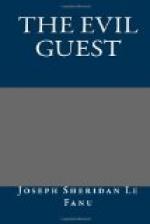spot) the idea of anticipating resistance by murder
had associated itself. He had contended against
these haunting and growing solicitations of Satan,
with an earnest agony. He had intended to leave
his place, and fly from the mysterious temptation
which he felt he wanted power to combat, but accident
or fate prevented him. In a state of ghastly
excitement he had, on the memorable night of Sir Wynston’s
murder, proceeded, as had afterwards appeared in evidence,
by the back stair to the baronet’s chamber; he
had softly stolen into it, and gone to the bedside,
with the weapon in his hand. He drew his breath
for the decisive stroke, which was to bereave the
(supposedly) sleeping man of life, and when stretching
his left hand under the clothes, it rested upon a
dull, cold corpse, and, at the same moment, his right
hand was immersed in a pool of blood. He dropped
the knife, recoiled a pace or so. With a painful
effort, however, he again grasped with his hand to
recover the weapon he had suffered to escape, and
secured, as it afterwards turned out, not the knife
with which he had meditated the commission of his
crime, but the dagger which was afterwards found where
he had concealed it. He was now fully alive to
the horror of his situation; he was compromised as
fully as if he had in very deed driven home the weapon.
To be found under such circumstances, would convict
him as surely as if fifty eyes had seen him strike
the blow. He had nothing now for it but flight;
and in order to guard himself against the contingency
of being surprised from the door opening upon the
corridor, he bolted it; then groped under the murdered
man’s pillow for the booty which had so fatally
fascinated his imagination. Here he was disappointed.
What further happened you already know.”
Charles listened with breathless attention to this
recital, and, after a painful interval, said—
“Then the actual murderer is, after all, unascertained.
This is, indeed, horrible; it was very natural that
my father should have felt the danger to which such
a disclosure would have exposed the reputation of our
family, yet I should have preferred encountering it,
were it ten times as great, to the equivocal prudence
of suppressing the truth with respect to a murder
committed under my own roof.”
“He has, however, it would seem, arrived at
some new conclusions,” said Dr. Danvers, “and
is now prepared to throw some unanticipated light upon
the whole transaction.”
Even as they were talking, a knocking was heard at
the hall-door, and after a brief and hurried consultation,
it was agreed, that, considering the strict condition
of privacy attached to this visit by Mr. Marston himself,
as well as his reserved and wayward temper, it might
be better for Charles to avoid presenting himself
to his father on this occasion. A few seconds
afterwards the door opened, and Mr. Marston entered
the apartment. It was now dark, and the servant,
unbidden, placed candles upon the table. Without
answering one word to Dr. Danvers’ greeting,
Marston sat down, as it seemed, in agitated abstraction.
Removing his hat suddenly (for he had not even made
this slight homage to the laws of courtesy), he looked
round with a care-worn, fiery eye, and a pale countenance,
and said—




